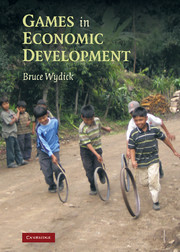Book contents
- Frontmatter
- Contents
- List of Figures and Tables
- Preface
- 1 Economic Development, Interdependence, and Incentives
- 2 Games
- 3 Development Traps and Coordination Games
- 4 Rural Poverty, Development, and the Environment
- 5 Risk, Solidarity Networks, and Reciprocity
- 6 Understanding Agrarian Institutions
- 7 Savings, Credit, and Microfinance
- 8 Social Learning and Technology Adoption
- 9 Property Rights, Governance, and Corruption
- 10 Conflict, Violence, and Development
- 11 Social Capital
- 12 The Political Economy of Trade and Development
- Appendix
- Exercises for Interested Readers
- References
- Index
10 - Conflict, Violence, and Development
Published online by Cambridge University Press: 05 September 2012
- Frontmatter
- Contents
- List of Figures and Tables
- Preface
- 1 Economic Development, Interdependence, and Incentives
- 2 Games
- 3 Development Traps and Coordination Games
- 4 Rural Poverty, Development, and the Environment
- 5 Risk, Solidarity Networks, and Reciprocity
- 6 Understanding Agrarian Institutions
- 7 Savings, Credit, and Microfinance
- 8 Social Learning and Technology Adoption
- 9 Property Rights, Governance, and Corruption
- 10 Conflict, Violence, and Development
- 11 Social Capital
- 12 The Political Economy of Trade and Development
- Appendix
- Exercises for Interested Readers
- References
- Index
Summary
And knowing their thoughts Jesus said to them, “A kingdom divided against itself is laid waste; and any city or house divided against itself will not stand.”
– Matthew 12:25JOSEPH KONY IS not an ordinary guerrilla leader. A former priest and witch doctor, he heads the Lord's Resistance Army (LRA), an insurgent movement that roams the jungle areas of northern Uganda and southern Sudan. Regarded as one of the world's most brutal revolutionary movements, the LRA's stated purpose is to overthrow the Ugandan government, replacing it with one that rules the country by the Ten Commandments. Ironically, it is difficult to think of an insurgency that violates the Ten Commandments more thoroughly than the LRA. The modus operandi of the LRA has been to conduct nightly raids on the houses of rural homesteaders, pillaging food and supplies, raping women and young girls, and abducting young boys to flesh out its ranks. The number of its victims is staggering. According to the United Nations, in the two decades since its foundation in the mid-1980s, members of the LRA have abducted more than 20,000 boys and driven more than 2 million people from their homes. When abducted, the boys are regularly forced to kill or maim members of their own families in the hope that they will be ashamed to return home. The LRA then assimilates the abducted boys into its company as guerilla soldiers by brainwashing them with its quasi-religious doctrine.
- Type
- Chapter
- Information
- Games in Economic Development , pp. 170 - 196Publisher: Cambridge University PressPrint publication year: 2007



